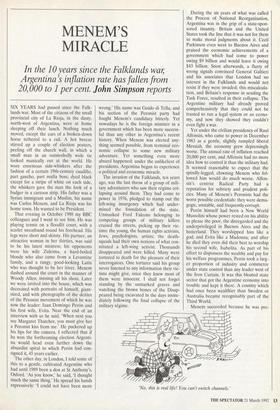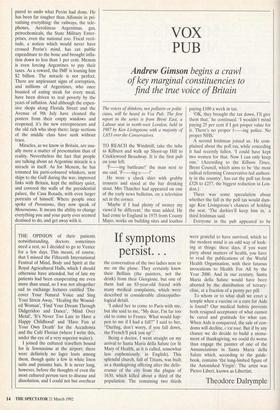MENEM'S MIRACLE
In the 10 years since the Falklands war Argentina's inflation rate has fallen from
SIX YEARS had passed since the Falk- lands war. Most of the citizens of the small provincial city of La Rioja, in the dusty, north-west of Argentina, were at home sleeping off their lunch. Nothing much moved, except the ears of a broken-down horse tethered to a rail. A hot breeze stirred up a couple of election posters, peeling off the church wall, in which a small man in an outmodedly wide tie looked manically out at the world. He wore enormous side-whiskers after the fashion of a certain 19th-century caudillo, part gaucho, part mafia boss; dyed black except for a stripe of white on each side, the whiskers gave the man the look of a badger in a cartoon strip. His father was a Syrian immigrant and a Muslim, his name was Carlos Menem, and La Rioja was his home town. He wanted to be President.
That evening in October 1988 my BBC colleagues and I went to see him. He was playing tennis on a floodlit court, with a scarlet sweatband round his forehead., His legs were short and skinny. His partner, an attractive woman in her thirties, was said to be his latest mistress; his opponents were his wife Zuleima, a hard-boiled blonde who also came from a Levantine family, and a rangy, good-looking Latin who was thought to be her lover. Menem dashed around the court in the manner of Woody Allen, missing all his shots. Later we were invited into the house, which was decorated with portraits of himself, giant- sized, and with photographs of the deities of the Peronist movement of which he was now the leader: Juan Domingo Perlin and his first wife, Evita. Near the end of an interview with us he said, 'When next you see Margaret Thatcher, you must give her a Peronist kiss from me.' He puckered up his lips for the camera. I reflected that if he won the forthcoming election Argenti- na would head even further down the absurdist spiral to which Peron had con- signed it, 45 years earlier.
The other day, in London, I told some of this to a gentle, cultivated Argentine who had until 1989 been a don at St Anthony's, Oxford. 'As you know,' he said, 'I thought much the same thing.' He spread his hands expressively: 'I could not have been more wrong.' His name was Guido di Tella, and his section of the Peronist party had fought Menem's candidacy bitterly. Yet nowadays he is the foreign minister in a government which has been more success- ful than any other in Argentina's recent history. When Menem was elected any- thing seemed possible, from terminal eco- nomic collapse to some new military adventure. Yet something even more absurd happened: under the unlikeliest of presidents, Argentina began to experience a political and economic miracle.
The invasion of the Falklands, ten years ago, was the last throw of a group of mili- tary adventurers who saw their regime col- lapsing around them. They had come to power in 1976, pledged to stamp out the left-wing insurgency which had under- mined the foundation of the state. Unmarked Ford Falcons belonging to competing groups of military killers cruised the streets, picking up their vic- tims: the young, the human rights activists, Jews, psychologists, artists; the death- squads had their own notions of what con- stituted a left-wing activist. Thousands disappeared and were killed. Many were tortured to death for the pleasure of their interrogators. One torturer said his group never listened to any information their vic- tims might give, since they knew most of them were innocent. I shall not forget standing by the unmarked graves and watching the brown bones of the Disap- peared being excavated in the days imme- diately following the final collapse of the military regime. During the six years of what was called the Process of National Reorganisation, Argentina was in the grip of a state-spon- sored insanity. Britain and the United States took the line that it was not for them to make moral judgments about it. Cecil Parkinson even went to Buenos Aires and praised the economic achievements of a government which had come to power owing $9 billion and would leave it owing $43 billion. Soon afterwards, a flurry of wrong signals convinced General Galtieri and his associates that London had no interest in the Falklands and would not resist if they were invaded; this miscalcula- tion, and Britain's response in sending the Task Force, resulted in their collapse. The Argentine military had already proved comprehensively that they could not be trusted to run a legal system or an econo- my, and now they showed they couldn't even fight a war.
Yet under the civilian presidency of Raul Alfonsin, who came to power in December 1983 as a gentle, slightly rumpled liberal Messiah, the economy grew depressingly worse. The annual rate of inflation reached 20,000 per cent, and Alfonsin had no more idea how to control it than the military had. It seemed reasonable to expect that the spindly-legged, clowning Menem who fol- lowed him would do much worse. Alfon- sin's centrist Radical Party had a reputation for sobriety and prudent poli- cies. Many of Menem's Peronists had the worst possible credentials: they were dema- gogic, unstable, and frequently corrupt.
Peron himself had been a New World Mussolini whose power rested on his ability to please the poor, the disregarded and the underprivileged in Buenos Aires and the hinterland. They worshipped him like a god, and Evita like a Madonna; and after he died they even did their best to worship his second wife, Isabelita. As part of his effort to dispossess the wealthy and pay for his welfare programmes, Peron took a larg- er proportion of industry and commerce under state control than any leader west of the Iron Curtain. It was this bloated state sector that got the Argentine economy into trouble and kept it there. A country which had once been wealthier than Sweden or Australia became recognisably part of the Third World.
Menem succeeded because he was pre- 'No, this is real life! You can't switch channels.' pared to undo what Per6n had done. He has been far tougher than Alfonsin in pri- vatising everything: the railways, the tele- phones, Aerolineas Argentinas, gas, petrochemicals, the State Military Enter- prises, even the national zoo. Fiscal recti- tude, a notion which would never have crossed Peron's mind, has cut public expenditure to the bone and brought infla- tion down to less than 1 per cent. Menem is even forcing Argentines to pay their taxes. As a reward, the IMF is loaning him $2 billion. The miracle is not perfect. There are unpleasant signs of corruption, and millions of Argentines, who once boasted of eating steak for every meal, have been driven to real poverty by the years of inflation. And although the expen- sive shops along Florida Street and the Avenue of 9th July have cleaned the posters from their empty windows and reopened, it's the new entrepreneurs and the old rich who shop there; large sections of the middle class have sunk without trace.
Miracles, as we know in Britain, are usu- ally more a matter of presentation than of reality. Nevertheless the fact that people are talking about an Argentine miracle is a miracle in itself. As for Menem, he has trimmed his parti-coloured whiskers, sent ships to the Gulf during the war, improved links with Britain, kept the military quiet, and covered the walls of the presidential palace, the Casa Rosada, with even larger portraits of himself. Where people once spoke of Peronismo, they now speak of Menemismo. It means the ability to change everything you and your party ever seemed destined to do, and get away with it.



























































 Previous page
Previous page